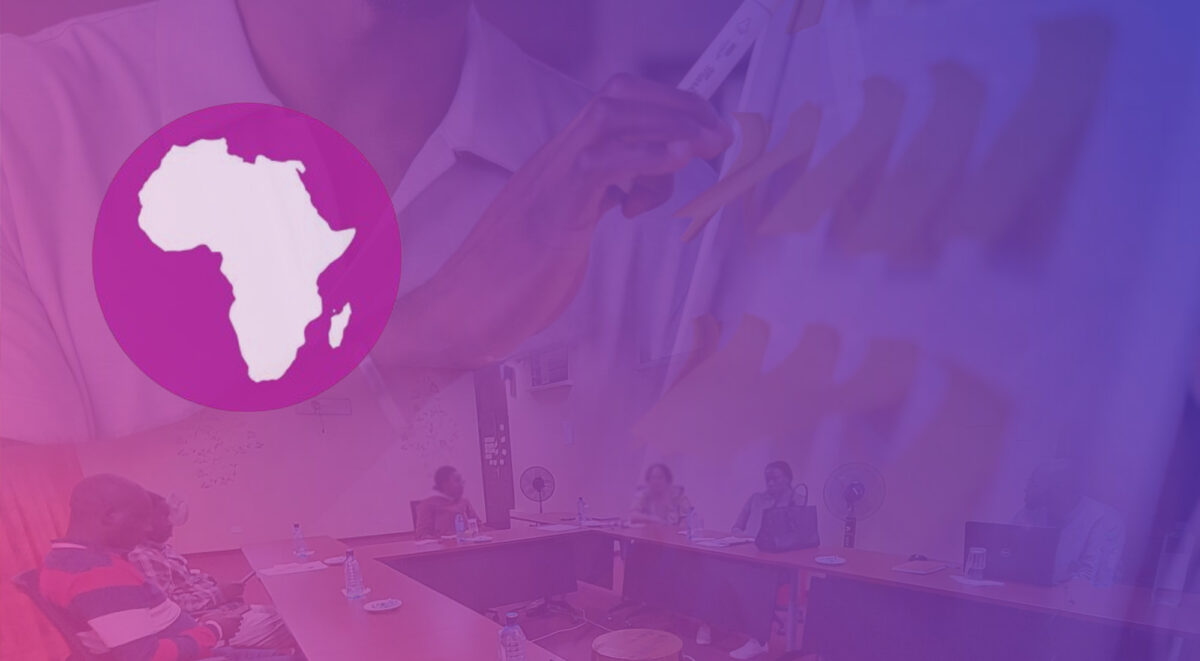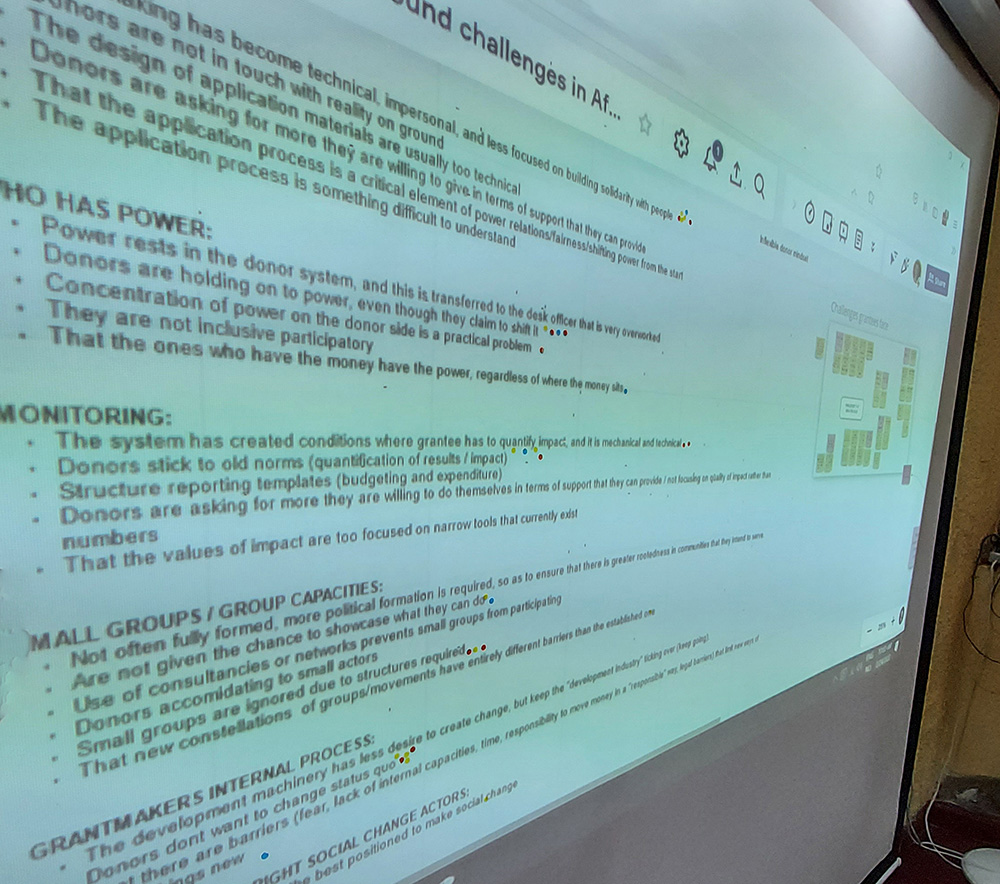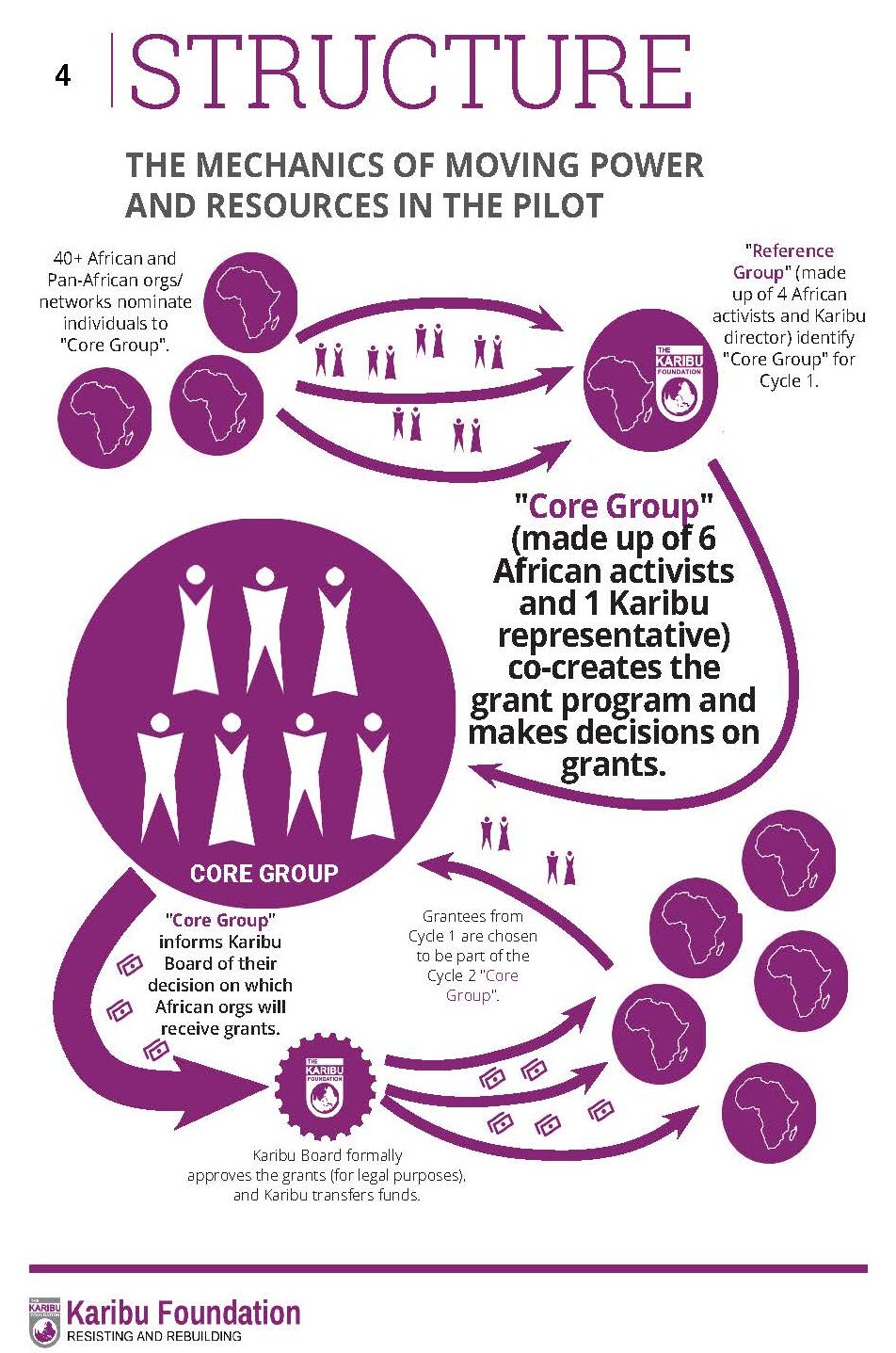

“Core Group” of the Karibu New Realities Grant
The “Core Group” of the Karibu New Realities Grant is the decision-making group of the pilot. The group consists of African activists and civil society members (together with Karibu’s representative) who reflect a breadth of backgrounds, ages, regions, and thematic experiences on the continent.
The journey of “Bongi”
“Bongi Koza” is a civil society leader and small-scale farmer living in Southern Africa. For the past two years, her region has been hit by double threats: Consecutive, extreme ecological events and the devastating impact of the COVID-19 pandemic.
Not only has Bongi experienced crop destruction through flash floods and dry spells, her country is now facing an even more unstable economic reality where marginalized people are becoming even more vulnerable. On top of this, unjust trade agreements and pandemic-related border closings in the region only make access to fair wages even more challenging.
The mother of two is worried about what the future brings for her children and her continent. Yet for Bongi, there is only one natural thing to do: to mobilize to confront these systems.
Mobilizing for deep change – but lacking funding
Bongi joins forces other strong women to organize and build a new reality from the ground up. Together with a collective of womens’ groups from across the region, they develop a joint plan to organize and advocate for alternative models of small-scale sustainable agriculture in order to fight poverty and hunger, strive for gender equality in a very patriarchal society, and to combat climate change. There is power in collective action, and Bongi and her sisters are fighting the system through the ways they know best.
They have a plan; they have the experience; they have the people.
What her network doesn’t have is access to funding to do their work; and they meet a grant-making system where values of mutual understanding, inclusive solutions, collaboration and shared responsibility, and equitable distribution of wealth and opportunities are all-too-often left out of the picture.
The pain of applying for funds
“Bongi” is only a fictional representative of one of the many civil society leaders and groups in Sub-Saharan Africa who are struggling for change in a new and changing reality on the continent. Yet civil society groups and movements in Africa know that getting access to funds for their social change efforts is a challenge. Application forms are becoming more and more technical, the applicants’ own strategies are often seen as less valuable than what the donor wants, and the decision-making power around grants lies too far away

The power imbalances become even more visible when donors in the global North provide grants to movements in the global South. The colonial legacies and continued unequal distribution of power and resources on a global level remain an inherent factor in the relationship.
It is time to rethink how we do grantmaking in Africa.
A journey in participatory grantmaking
Imagine if there was a grant-making process that moved decision-making power around funding closer to the “Bongis” in Africa, and an application process that placed her journey and struggles front-and-center when she applied for funds? This is the aim of Karibu’s new grantmaking pilot project: the Karibu New Realities Grant.
In November 2021, we – a “Core Group” consisting of African activists and civil society members, together with Karibu’s representative – began our work of co-creating a new grantmaking program for movements in Sub-Saharan Africa. We come from a breadth of backgrounds, ages, regions, and thematic experiences on the continent. Through a “participatory grantmaking” approach, we are currently re-thinking the grantmaking process.
Our group met physically in Nairobi, Kenya in February 2022 – the first chance to come together physically in the new “COVID-19” reality.
We are currently listening and learning from other movements, building a grantmaking process that is based on the experiences of the activists like “Bongi” in Africa, and are working to define eligibility requirements that take into account the African experience and context.
Karibu New Realities Grant

Over the next two years, the grant program we are building – the “Karibu New Realities Grant” – will aim to support bold, innovative, forward thinking, “constructive troublemaking”, and imaginative initiatives that add new dimensions and make stronger the collective struggle for systemic justice. Grants that eventually are provided in this pilot will support creative, strategic, agenda-setting, and network-building formations in Sub-Saharan Africa that are able to connect the local / national struggle with regional / global realities.
Those that will be awarded grants will be working to challenge and re-think the massive economic, socio-cultural, political, and ecological crises (all of which are inherently linked to a crisis of capitalism) that the continent is currently facing.
We plan to release more detailed information and a call for applications for our first cycle in July 2022.
An experiment for systemic change
Our grantmaking program is an experiment in challenging unjust systems in two ways.
First, we are trying to build a new program that addresses some of the challenges of a system of traditional, global North-driven funding. We are trying to shift power related to grantmaking and financial resources to movements on the ground in Africa. We are working to define, design, introduce, and drive new solutions based on the experience of movements themselves.
Second, we are aiming to support change agents on the continent in their struggle for deep, systemic change in Africa. Our hope is that the grants can provide added support to the change actors on the ground who best know how to challenge the “crises” around them. And our hope is to support a next generation of civil society who bring forward new models of activism and alternatives that contribute to stopping the bad & building the new.
More information about the “Karibu New Realities Grant” will be made available in the next couple of months.
We encourage all of the groups of “Bongis” out there (creative, strategic, agenda-setting, and network-building groups and formations in Africa that are working for systemic change) to apply.
